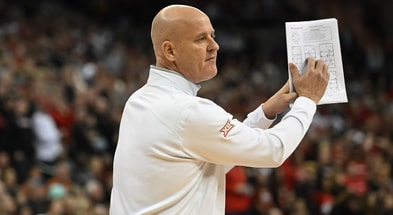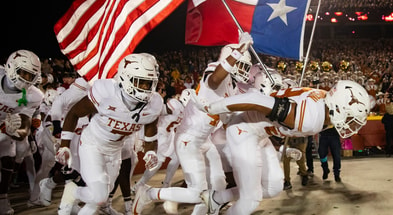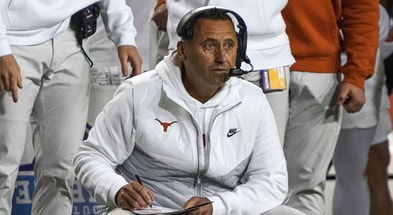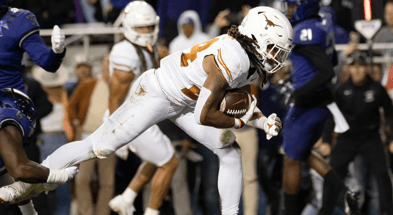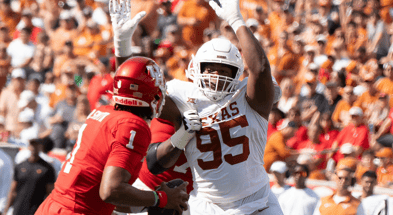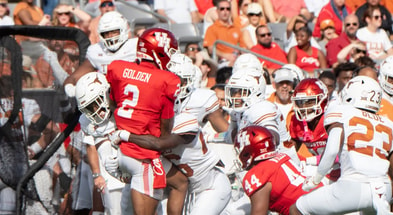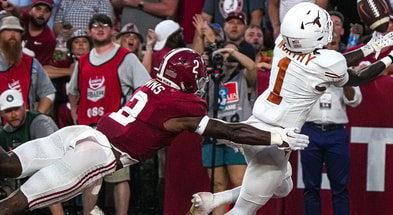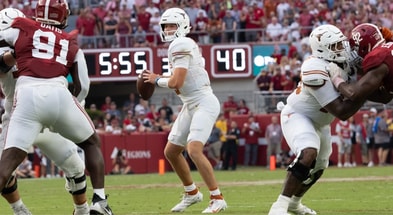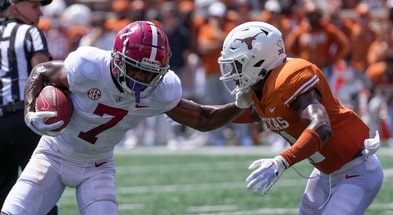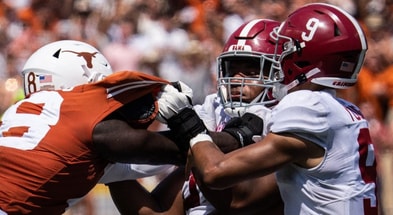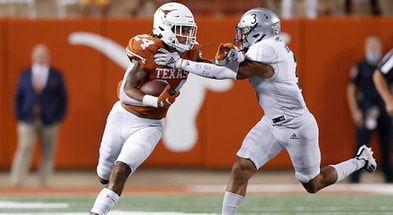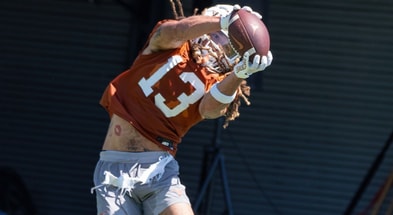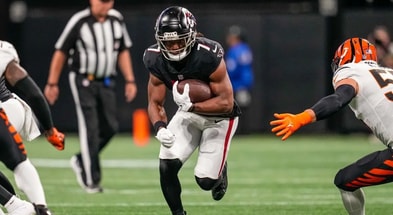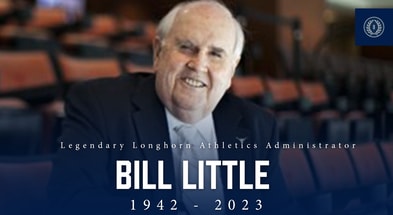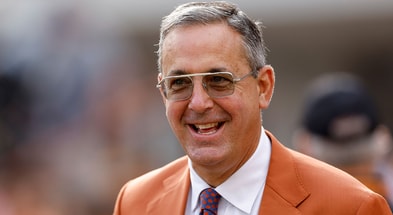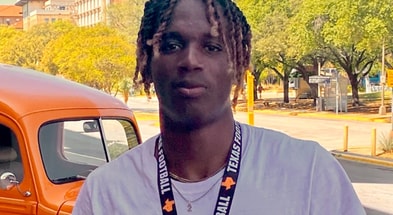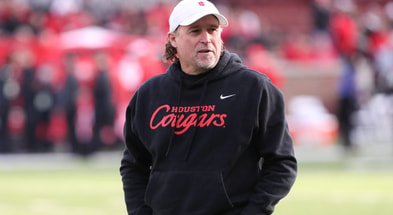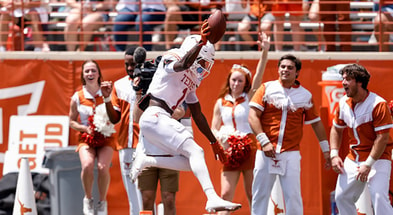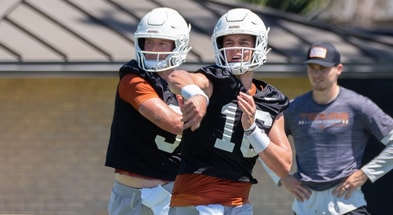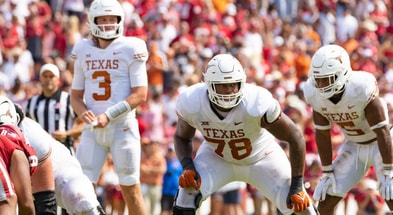Players, coaches talk tempo
AUSTIN — Seventy plays in 10 minutes.
That’s how fast Sterlin Gilbert’s offense is moving these days. That’s more plays than Texas’ defense faced in entire games last season. And that’s part of the reason defensive coordinator Vance Bedford was nursing a raspy voice during his impromptu visit with members of the media Tuesday.
Bedford said he lost his voice from yelling at his defense after the Horns returned to practice following spring break. The comment was intended as tongue-in-cheek. Sort of.
Bedford let the players do all the talking, and nearly all they could talk about was an offense in which the play-calling was approaching warp speed. In fact, the tempo this spring has been more brisk than any the defense has faced against a league renowned for its blink-and-you-miss-it, no-huddle offenses.
“We’re definitely going faster than anyone I’ve ever played against or practiced against,” said safety Dylan Haines. “If they keep that tempo up, it’s going to keep defenses on their toes.”
It’s also kept the Longhorn defense out-of-position this spring.
“Sometimes we don’t get lined-up,” Haines told me. “One of the things coaches have been stressing is that when you’re tired – and sometimes the offense goes in sets of four or five plays – that’s when you have to focus on fundamentals and techniques. If you know you’re breaking down in the last four or five plays, you know that’s the thing you have to work on. We know that when we play teams in the Big 12, we’ll be tired out there and the offenses are looking to attack you and they’re looking to throw the ball down field.”
Gilbert wants a balanced-attack, players said Tuesday.
But head coach Charlie Strong has said, repeatedly, that the strength of this year’s squad is in the running back room. Strong wants the all-important quarterback battle to be settled within the next three weeks, but there’s little doubt Texas’ up-tempo spread will be predicated on a power running game. Not many teams can hit you with a pair of power-backs who tip the scales in the 240-pound range.
Chris Warren played at 235 last season but beefed-up to 255 pounds (mainly in his lower body) during the off-season. The faster pace this spring contributed to his shedding 10 pounds.
“We get back on the ball and keep repping it, repping it, reppingit, and keep going fast,” Warren told Inside Texas. “We make sure that if a guy gets tired, we bring a fresh guy in. And we’re doing that.”
Warren set a single-game, UT freshman rushing record when he bludgeoned Texas Tech to the tune of 276 yards. He followed with a 100-yard outing in the season-ending win at Baylor. And then, for the first time in his career, Warren hit the weight room.
“If you have a bigger back in an up-tempo offense, if you decide to run the ball two or three times in a row going that fast, over time you’re going to drain a defense a lot faster than normal,” Warren said. “It will give us more opportunity to make plays and it will set up the play-action.”
Junior RB D’Onta Foreman announced he is “100 percent” healthy following surgery on his right hand (pinky). Foreman sustained the injury the 10th game of the season at West Virginia.
“We’re trying to get in as many plays as we can with the up-tempo offense,” Foreman said. “We’re trying to make sure everybody is doing what they’re supposed to do. We’re trying to make sure the call gets to the line and making sure it’s efficient.”
It helps to have the offensive coordinator and the offensive line coach on the same page, Foreman candidly (and, obviously) conceded. In 2015, interim playcaller Jay Norvell and line coach Joe Wickline harbored philosophical differences in a piecemealed, sputtering scheme that emerged only because the up-tempo spread entrusted to Shawn Watson failed to materialize. Gilbert insisted on hiring assistants who were more familiar with the nomenclature of his offense.
“Even when they (Gilbert and O-line coach Matt Mattox) are not around each other,” Foreman said, “they’re still going to tell me the same thing. (RB) Coach (Anthony Johnson) is just reiterates what they’ve already said. It helps a lot.”
The immediate payoff is the relative ease in which the play is signaled from sideline-to-huddle. The reliance on hand signals has simplified, and expedited, the communication, Foreman added.
“It’s a lot different from last year,” Foreman said. “The play-calling is a lot faster. The signaling-in is a lot faster. The signals are shorter, and that makes everything faster. We talk about it every day to make sure that everything in the interior is going the way it’s supposed to go.”
Defensively, Texas’ defense has nowhere to go but up after finishing 2015 as the statistically worst unite in program history.The defense has whiffed (and gasped and wheezed) against an offense when it operates at breakneck speed. But that will pay dividends once the 2016 season begins, Haines believes.
“If a team comes out there during the season and not go as fast as (our offense), that’s going to make us better. We’re going to be so used to seeing a fast, up-tempo team that we’ll have more time to work on our alignments, to read things out and to look at formations.”
And if the offense remains mired in mediocrity, it will at least go nowhere fast.


